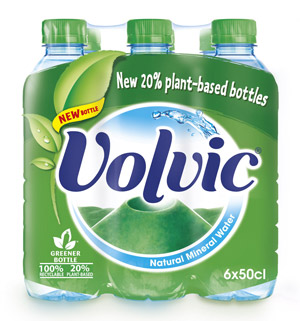PET BOTTLES
Two innovative launches in UK / Volvic introduces bottle made partially of sugar molasses / Belu Water showcases bottle made of 50% rPET
Two companies are claiming separate innovations in the PET bottle market in the UK: Volvic (Trowbridge / UK; www.volvic.co.uk) has introduced a bottle containing 20% of polymer derived from sugar cane waste, while Belu Water (London / UK; www.belu.org) has developed a bottle with 50% recycled content. Both bottles are said to have a significantly lower carbon footprint than conventional bottles based on virgin PET.
 Volvic's new "Greener Bottle" contains both rPET and BioPet (Photo: Volvic) |
The 500ml “Greener Bottle” from Volvic Natural Mineral Water contains 20% recycled PET and 20% of BioPET plant-based polymer created by combining PET with fermented and dehydrated sugarcane waste which is being sourced from India. The carbon footprint of this new, 100% recyclable bottle is 38% lower than that of a standard bottle. In addition, its total lifecycle footprint is 16% lower. Volvic is introducing the bottle commercially in December and says it will reduce its weight from 17g to 15g, in effect halving the carbon footprint of the current bottle.
The weight of plastics materials used in Volvic bottles has been reduced by 30% over the last 15 years, said Nadine Slyper, marketing manager at Volvic UK. The Greener Bottle is the company’s first step towards integrating renewable materials and is regarded as a key milestone on the way to reducing Volvic’s global carbon footprint by 40% from 2008 to 2012.
Belu Water, a social enterprise that commits all its profits to funding clean water projects, says its new 500ml bottle with a 50% rPET content, available at the end of September, represents 46% in carbon savings compared with its standard bottle. The bottle is part of Belu’s long-term strategy of promoting better recycling and better processing of raw materials.
The introduction of the 50% rPET bottle comes on the heels of a small consumer survey Belu carried out in August, which showed that 95% of people thought plastic water bottles should be made from recycled materials, although only 29% assumed they were already produced from recycled plastics.
The weight of plastics materials used in Volvic bottles has been reduced by 30% over the last 15 years, said Nadine Slyper, marketing manager at Volvic UK. The Greener Bottle is the company’s first step towards integrating renewable materials and is regarded as a key milestone on the way to reducing Volvic’s global carbon footprint by 40% from 2008 to 2012.
Belu Water, a social enterprise that commits all its profits to funding clean water projects, says its new 500ml bottle with a 50% rPET content, available at the end of September, represents 46% in carbon savings compared with its standard bottle. The bottle is part of Belu’s long-term strategy of promoting better recycling and better processing of raw materials.
The introduction of the 50% rPET bottle comes on the heels of a small consumer survey Belu carried out in August, which showed that 95% of people thought plastic water bottles should be made from recycled materials, although only 29% assumed they were already produced from recycled plastics.
28.09.2010 Plasteurope.com [217369]
Published on 28.09.2010
